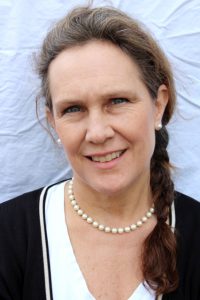
For most of her life, Debby Irving had been confident she knew what “race” and “racism” were.
That all changed when, at 48, she took a graduate school course on racial and cultural identity.
“I learned that I had been insulated my whole life from understanding what race and racism were, how they functioned in the United States, and most importantly, how they functioned in my life and my family’s life,” said Irving, a racial justice educator and author of Waking Up White: And Finding Myself in the Story of Race. “For me, that’s what Waking Up White means: waking up to what it means to be a white person living in the United States.”
At 2 p.m. Monday, August 19, in the Hall of Philosophy, Irving will present “Waking Up White, And Finding Myself in the Story of Race,” the first lecture in Week Nine’s Interfaith Lecture Series, “Exploring Race, Religion, and Culture.”
“In my experience, many white people think of (themselves) as just ‘American,’ or ‘normal,’ ” Irving said. “We don’t have developed racial identity, so we often think — and this was my situation — that race belongs to other people. I thought that race was something that belongs to black and brown people, and I was going to be helpful and try to level the playing field.”
What Irving was missing, she said, was that being a white person hadn’t set her up to understand racial disparities in the first place.
“I don’t know where the racial barriers are, for instance, as a white person, because I’m not experiencing them,” she said. “When I go in for a loan at a bank, whether for a home, car or education, I don’t know that black or brown people are getting charged a higher rate. Part of that is because I was living a racially segregated life.”
In that scenario, Irving said that since her white friends and family were getting the same loan rates as her, any barriers affecting minority groups wouldn’t be apparent because they wouldn’t surface in conversation.
Irving’s career as a racial justice educator wasn’t something she ever expected.
“I didn’t find this; it found me,” she said. “It was the last thing I would have expected going in to.”
According to Irving, growing up in the 1960s has given her a unique perspective on racial injustice then, as compared to now.
“It was a time of incredible insulation,” she said. “And part of that insulation was due to there being only three television networks: ABC, NBC and CBS. People isolated in white places got pretty much the same news every night as other white people across the country. It was a different kind of ‘fake news.’ ”
In Irving’s household growing up, all that was needed to isolate oneself from the cultural movements of the era was to turn off the television.
“Contrast that to today, where we have thousands of ways to get our media,” she said. “And it’s possible, if you know what you’re looking for, to get some really in-your-face information. If we’re talking specifically about race, we’re seeing black bodies get shot. We’re finally able to see firsthand what happens to black people living in the United States, and it’s a wake-up call.”
It’s Irving’s hope that Chautauquans who attend her lecture today leave the Hall of Philosophy unsurprised that “we’re where we are as a country right now — in terms of division, hateful rhetoric and violence.”
“I’d like them to walk away with a sense of what everybody can do to change that,” she said.




